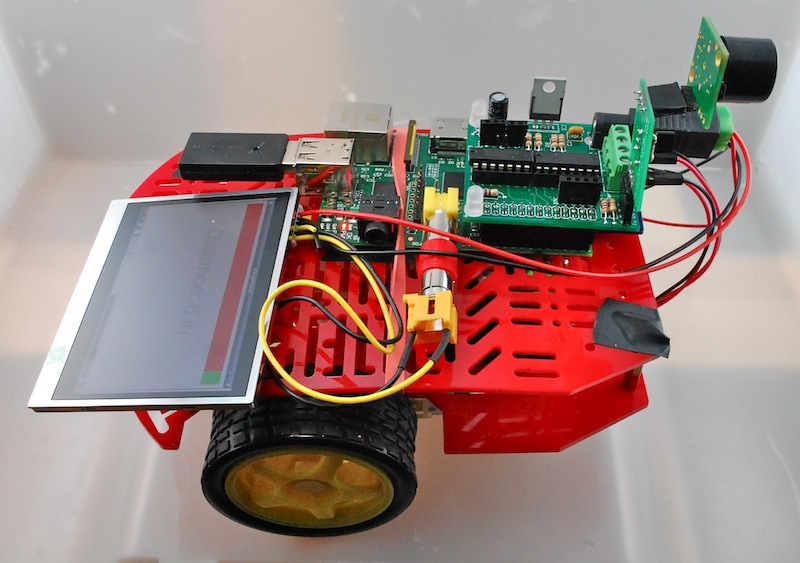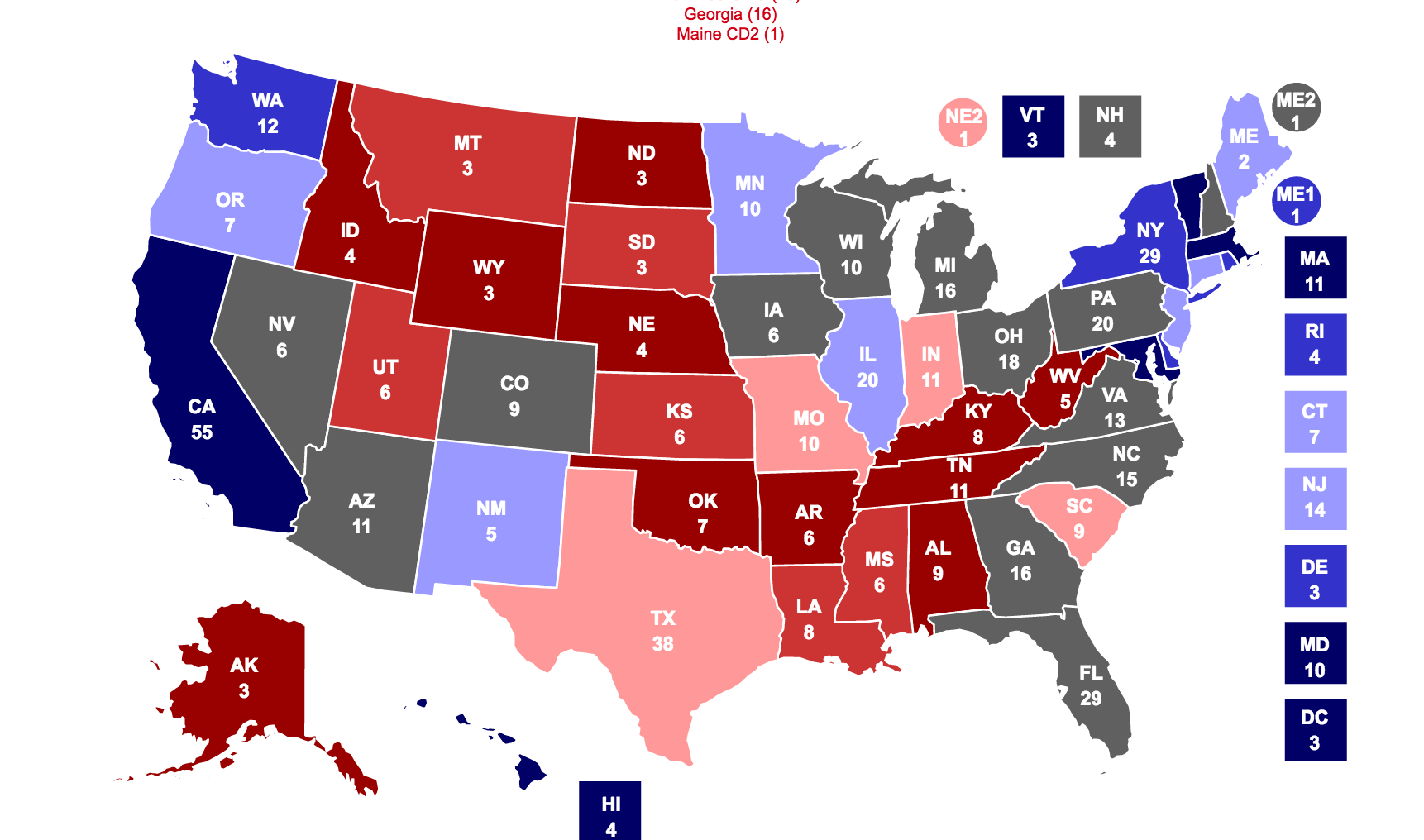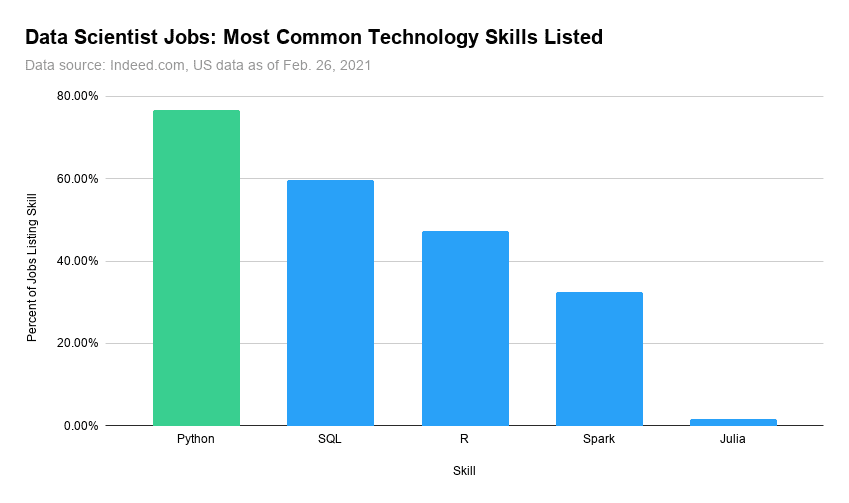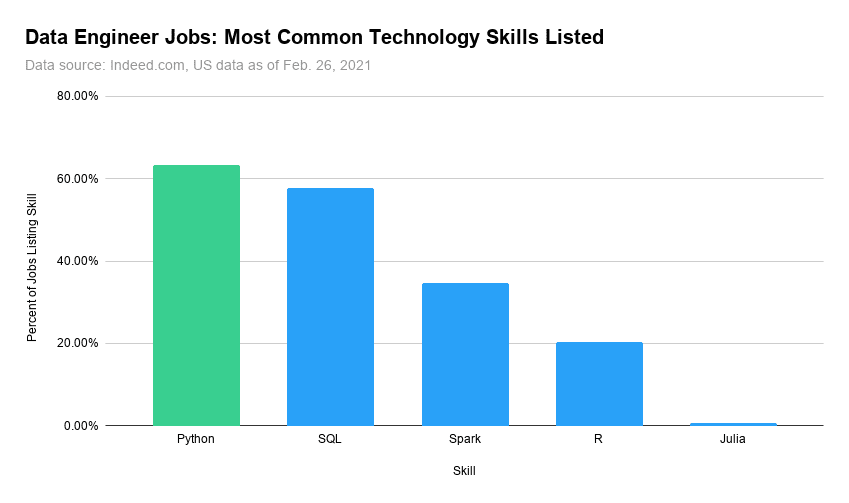How To Learn Python Quickly
How to Learn Python (Footstep-past-Step) in 2022
Published: February 24, 2021

What's the all-time way to learn Python? It doesn't have to feel like scaling a cliff!
Python is an of import programming language to know — information technology'south widely-used in fields similar data science, web development, software engineering science, game development, automation. Merely what's the all-time fashion to learn Python? That can be difficult and painful to figure out. I know that from experience.
1 of the things that I establish most frustrating when I was learning Python was howgeneric all the learning resources were. I wanted to learn how to make websites using Python, but it seemed like every learning resource wanted me to spend two long, boring, months on Python syntax before I could even think near doing what interested me.
This mismatch made learning Python quite intimidating for me. I put information technology off for months. I started some tutorials but presently stopped. I looked at Python code, but it was foreign and confusing:
from django.http import HttpResponse def alphabetize(request): return HttpResponse("Hello, world. You're at the polls index.") The above code is from the tutorial for Django, a popular Python website development framework. Experienced programmers will often throw snippets similar the above at y'all. "It'southward easy!", they'll promise.
Merely even a few seemingly elementary lines of lawmaking can be incredibly confusing. For instance, why are some lines indented? What's django.http? Why are some things in parentheses?
Understanding how everything fits together when you don't know much Python can be very hard.
The trouble is that yous need to understand the edifice blocks of the Python language to build anything interesting. The above lawmaking snippet creates a view, which is ane of the key building blocks of a website using the popular MVC architecture. If you don't know how to write the lawmaking to create a view, it isn't really possible to make a dynamic website.
About tutorials presume that you need to learnall of Python syntax before you lot can offset doing anything interesting. This is what leads to months spent just on syntax, when what you actually want to exist doing is analyzing information, or building a website, or creating an autonomous drone.
All that time spent on syntax rather than what you desire to be doing causes your motivation to ebb away, and to you just calling the whole thing off.
I like to think of this equally the "cliff of ho-hum". You demand to be able to climb the "cliff of boring" to arrive to the "land of interesting stuff you lot work on" (better proper noun pending).
But you lot don't have to spend months on that cliff.

Learning Python syntax doesn't accept to feel similar this.
After facing the "cliff of tiresome" a few times and walking abroad, I found a procedure that worked better for me. In fact, I think this is the best way to acquire Python.
What worked was blending learning the basics with building interesting things. I spent equally fiddling time as possible learning the basics, then immediately dove into creating things that interested me.
In this blog post, I'll walk you through step by pace how to replicate this process, regardless of why y'all want to learn Python.
Step 1: Effigy Out What Motivates You to Learn Python
Before y'all starting time diving into learning Python online, it's worth asking yourself why you want to learn it. This is because it'southward going to exist a long and sometimes painful journey. Without plenty motivation, you probably won't make it through. For example, I slept through high school and college programming classes when I had to memorize syntax and I wasn't motivated. On the other paw, when I needed to use Python to build a website to automatically score essays, I stayed upwards nights to finish it.
Figuring out what motivates you volition help you lot figure out an end goal, and a path that gets y'all at that place without boredom. You don't take to figure out an exact projection, just a general area you're interested in as yous prepare to learn Python.
Pick an surface area you're interested in, such as:
- Information scientific discipline / Machine learning
- Mobile apps
- Websites
- Games
- Data processing and analysis
- Hardware / Sensors / Robots
- Scripts to automate your work

Yeah, you lot can make robots using Python! From the Raspberry Pi Cookbook.
Figure out one or 2 areas that interest yous, and you lot're willing to stick with. You lot'll exist gearing your learning towards them, and somewhen will be building projects in them.
Footstep 2: Learn the Basic Syntax
Unfortunately, this step tin't be skipped. You lot have to learn the very basics of Python syntax before you swoop deeper into your chosen area. Y'all want to spend the minimum amount of time on this, as it isn't very motivating.
Here are some proficient resource to aid y'all learn the basics:
- Learn Python the Hard Way — a book that teaches Python concepts from the basics to more in-depth programs.
- Dataquest – Python for Data Science Fundamentals Course — I started Dataquest to make learning Python and data science easier. Dataquest teaches Python syntax in the context of learning data science. For case, you'll learn about for loops while analyzing conditions information.
- The Python Tutorial — the tutorial on the main Python site.
I can't emphasize plenty that you should but spend the minimum amount of time possible on bones syntax. The quicker you can get to working on projects, the faster you volition learn. You tin e'er refer dorsum to the syntax when yous get stuck subsequently. You should ideally merely spend a couple of weeks on this phase, and definitely no more a month.
Also, a quick notation: learn Python 3, not Python two. Unfortunately a lot of "learn Python" resource online notwithstanding teach Python two, but yous should definitely larn Python iii. Python 2 is no longer supported, and so bugs and security holes will not exist fixed!
Step 3: Brand Structured Projects
Once yous've learned the basic syntax, it'due south possible to kickoff making projects on your own. Projects are a cracking way to learn, because they let you utilise your noesis. Unless you utilise your cognition, information technology will exist hard to retain it. Projects will push your capabilities, help you learn new things, and help you build a portfolio to show to potential employers.
Even so, very freeform projects at this signal will be painful — you'll get stuck a lot, and need to refer to documentation. Because of this, it's ordinarily better to make more structured projects until you experience comfortable enough to make projects completely on your own. Many learning resource offer structured projects, and these projects let you build interesting things in the areas you care about while still preventing you from getting stuck.
Let's expect at some good resource for structured projects in each area:
Data science / Auto learning
- Dataquest — Teaches you lot Python and data science interactively. Y'all analyze a serial of interesting datasets ranging from CIA documents to NBA player stats. Y'all somewhen build complex algorithms, including neural networks and conclusion trees.
- Python for Data Analysis — written past the author of a major Python data analysis library, it's a proficient introduction to analyzing data in Python.
- Scikit-learn documentation — Scikit-acquire is the chief Python automobile learning library. It has some neat documentation and tutorials.
- CS109 — this is a Harvard form that teaches Python for data science. They have some of their projects and other materials online.
Mobile Apps
- Kivy guide — Kivy is a tool that lets you make mobile apps with Python. They have a guide on how to get started.
Websites
- Bottle tutorial — Bottle is another spider web framework for Python. This is how to get started with information technology.
- How To Tango With Django — A guide to using Django, a complex Python web framework.
Games
- Pygame tutorials — Pygame is a popular Python library for making games, and this is a list of tutorials for it.
- Making games with Pygame — A book that teaches y'all how to make games in Python.
- Invent your own computer games with Python — a book that walks you through how to make several games using Python.

An example of a game you can make with Pygame. This is Barbie Seahorse Adventures i.0, by Phil Hassey.
Hardware / Sensors / Robots
- Using Python with Arduino — learn how to use Python to control sensors connected to an Arduino.
- Learning Python with Raspberry Pi — build hardware projects using Python and a Raspberry Pi.
- Learning Robotics using Python — learn how to build robots using Python.
- Raspberry Pi Cookbook — learn how to build robots using the Raspberry Pi and Python.
Scripts to Automate Your Piece of work
- Automate the boring stuff with Python — larn how to automate day-to-day tasks using Python.
Once you've done a few structured projects in your ain area, y'all should be able to move into working on your own projects. But, before you lot do, it's of import to spend some time learning how to solve problems.
Pace 4: Work on Python Projects on Your Own
Once you've completed some structured projects, it'due south time to work on projects on your own to go along to learn Python better. You'll notwithstanding be consulting resource and learning concepts, but you lot'll be working on what you want to work on. Before you dive into working on your ain projects, you should feel comfortable debugging errors and problems with your programs. Here are some resources y'all should exist familiar with:
- StackOverflow — a customs question and answer site where people discuss programming issues. You lot tin find Python-specific questions hither.
- Google — the near commonly used tool of every experienced programmer. Very useful when trying to resolve errors. Here's an example.
- Python documentation — a good identify to find reference material on Python.
Once you have a solid handle on debugging issues, yous can start working on your ain projects. You should piece of work on things that interest you. For example, I worked on tools to trade stocks automatically very before long subsequently I learned programming.
Here are some tips for finding interesting projects:
- Extend the projects you were working on previously, and add more functionality.
- Check out our list of Python projects for beginners.
- Go to Python meetups in your area, and discover people who are working on interesting projects.
- Find open up source packages to contribute to.
- See if any local nonprofits are looking for volunteer developers.
- Detect projects other people have made, and see if you can extend or adapt them. Github is a good place to notice these.
- Browse through other people'southward web log posts to discover interesting project ideas.
- Think of tools that would make your every mean solar day life easier, and build them.
Remember to start very small. It'southward often useful to start with things that are very uncomplicated then you can gain confidence. Information technology's amend to start a small project that you stop that a huge project that never gets washed. At Dataquest, we accept guided projects that give you small information science related tasks that you tin can build on.
It's also useful to notice other people to work with for more motivation.
If you really tin't recall of whatsoever good projection ideas, here are some in each surface area we've discussed:
Data Science / Machine Learning Projection Ideas
- A map that visualizes election polling by state.
- An algorithm that predicts the atmospheric condition where yous live.
- A tool that predicts the stock market.
- An algorithm that automatically summarizes news manufactures.

You could make a more interactive version of this map. From RealClearPolitics.
Mobile App Project Ideas
- An app to track how far you lot walk every 24-hour interval.
- An app that sends you atmospheric condition notifications.
- A realtime location-based chat.
Website Project Ideas
- A site that helps you lot plan your weekly meals.
- A site that allows users to review video games.
- A notetaking platform.
Python Game Project Ideas
- A location-based mobile game, where you capture territory.
- A game where you lot program to solve puzzles.
Hardware / Sensors / Robots Projection Ideas
- Sensors that monitor your habitation temperature and let yous monitor your business firm remotely.
- A smarter alarm clock.
- A self-driving robot that detects obstacles.
Piece of work Automation Project Ideas
- A script to automate data entry.
- A tool to scrape data from the web.
My first project on my ain was adapting my automated essay scoring algorithm from R to Python. It didn't finish up looking pretty, simply it gave me a sense of accomplishment, and started me on the road to building my skills.
The key is to pick something and do it. If you get too hung upward on picking the perfect project, there's a risk that you'll never make i.
Stride 5: Go on working on harder projects
Go on increasing the difficulty and scope of your projects. If yous're completely comfortable with what you're building, information technology means it's fourth dimension to endeavor something harder.
You can choose a new project that
Here are some ideas for when that time comes:
- Try didactics a novice how to build a project y'all made.
- Can you lot scale up your tool? Tin it work with more than data, or tin can it handle more traffic?
- Can you lot make your program run faster?
- Tin can you make your tool useful for more than people?
- How would you lot commercialize what you've made?
Going forward
At the end of the day, Python is evolving all the fourth dimension. There are only a few people who can legitimately claim to completely understand the language, and they created it.
You'll need to exist constantly learning and working on projects. If y'all do this right, you'll discover yourself looking back on your code from 6 months agone and thinking about how terrible it is. If y'all go to this signal, you lot're on the correct rails. Working only on things that interest you ways that yous'll never become burned out or bored.
Python is a really fun and rewarding language to acquire, and I think anyone can go to a high level of proficiency in information technology if they observe the right motivation.
I promise this guide has been useful on your journey. If y'all have any other resource to suggest, please permit united states know!
Notice out more than most how you can learn Python and add this skill to your portfolio by visiting Dataquest.
Common Python Questions:
Is it hard to learn Python?
Learning Python tin certainly be challenging, and you're likely to have frustrating moments. Staying motivated to keep learning is one of the biggest challenges.
Withal, if you lot take the step-by-step approach I've outlined here, y'all should observe that it's easy to power through frustrating moments, because you'll be working on projects that genuinely involvement y'all.
Can y'all learn Python for complimentary?
There are lots of free Python learning resources out there — just hither at Dataquest, we have dozens of free Python tutorials and our interactive data science learning platform, which teaches Python, is free to sign upward for and includes many gratuitous lessons. The internet is full of free Python learning resources!
The downside to learning for free is that to larn what you lot want, you'll probably need to patch together a bunch of different free resources. You'll spend extra time researching what you demand to larn next, and then finding free resource that teach it. Platforms that cost money may offer better teaching methods (similar the interactive, in-browser coding Dataquest offers), and they also save y'all the time of having to notice and build your ain curriculum.
Tin yous learn Python from scratch (with no coding feel)?
Yes. At Dataquest, nosotros've had many learners start with no coding feel and go on to go jobs as data analysts, data scientists, and data engineers. Python is a corking linguistic communication for programming beginners to acquire, and you don't need any prior experience with lawmaking to pick it upwards.
How long does it have to learn Python?
Learning a programming language is a bit like learning a spoken linguistic communication — you're never actually done, because programming languages evolve and at that place's e'er more to learn! However, y'all can become to a point of being able to write simple-but-functional Python lawmaking pretty quickly.
How long it takes to get to job-ready depends on your goals, the task yous're looking for, and how much time you tin dedicate to report. Only for some context, Dataquest learners we surveyed in 2020 reported reaching their learning goals in less than a year — many in less than six months — with less than ten hours of written report per calendar week.
How can I learn Python faster?
Unfortunately, there aren't actually any hush-hush shortcuts! The best thing you can exercise is find a platform that teaches Python (or build a curriculum for yourself) specifically for the skill you desire to learn (for example, Python for game dev, or Python for information science).
This should ensure that you're not wasting whatsoever time learning things you lot won't actually need for your day-to-solar day Python work. But brand no mistake, whatsoever yous want to exercise with Python, it'll take some time to learn!
Do y'all demand a Python certification to find work?
Nosotros've written almost Python certificates in depth, but the short reply is: probably not. Different companies and industries take different standards, just in data science, certificates don't deport much weight. Employers intendance nearly the skills you have — being able to evidence them a GitHub full of great Python code ismuchmore important than being able to show them a document.
Should you learn Python 2 or iii?
We've written nearly Python ii or Python 3 equally well, but the short reply is this: acquire Python 3. A few years ago, this was even so a topic of debate, and some extreme predictions even claimed that Python 3 would "impale Python." That hasn't happened, and today, Python 3 is everywhere.
Is Python a skillful language to learn in 2021?
Yeah. Python is a pop and flexible language that's used professionally in a wide variety of contexts.
We teach Python for information science and automobile learning, for example, only if you wanted to apply your Python skills in another area, Python is used in finance, spider web evolution, software engineering, game development, etc.
If yous're working with data, Python is the most in-demand programming language you could learn. Here's data from open job postings on Indeed.com in February of 2021:



As you tin can encounter, Python is a critical skill, and it'south listed above every other technical skill in data scientist and data engineering task postings. It ranks second, backside just SQL, in data annotator task postings. Many jobs in all three areas will crave both Python and SQL skills, simply SQL is a query language. In terms of programming skills, Python is most in-demand.
(Incidentally, nosotros're sometimes asked why Dataquest doesn't teach Julia for data science. The charts above probably answer that question — our curriculum is very focused on real-world skills, and nosotros choose what courses to make based on an analysis of data job postings then that we can be sure the skills you learn at Dataquest are helpful in the real world.)
Moreover, Python data skills can be really useful even if you have no aspiration to become a full-time data scientist or programming. Having some information analysis skills with Python tin be useful for a wide variety of jobs — if you work with spreadsheets, chances are there are things you lot could be doing faster and ameliorate with a little Python.
Tags
Source: https://www.dataquest.io/blog/learn-python-the-right-way/
Posted by: snowdensaidence.blogspot.com


0 Response to "How To Learn Python Quickly"
Post a Comment